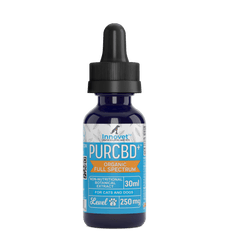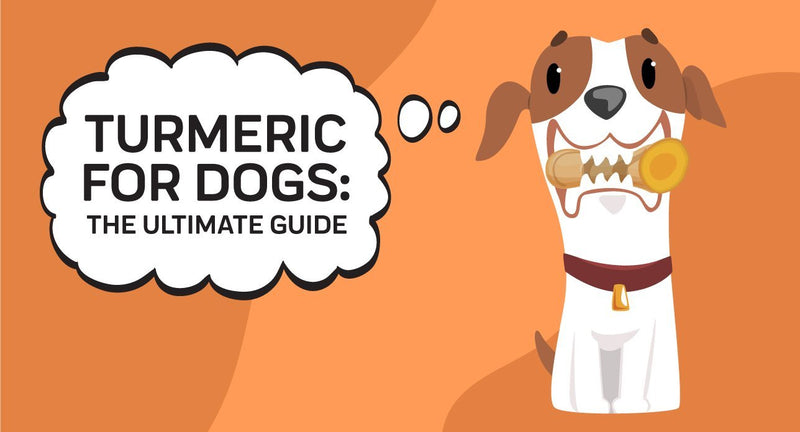- What is Melatonin and How Does it Work?
- What Are the Uses of Melatonin for Dogs?
- Is Melatonin Safe for Dogs?
- Potential Melatonin Side Effects to Look Out For!
- Dogs That Shouldn’t Take Melatonin
- How Much Melatonin for Dogs?
- Alternative Solutions: Innovet Pet
- Melatonin Overdose in Dogs
- Final Thoughts on How To Give Melatonin To Dogs
If you’ve ever had issues sleeping, you’ve likely come across melatonin. It’s a popular all-natural supplement used for treating insomnia. Many animals naturally produce melatonin to regulate their sleep.
But better sleep at night isn’t the only thing that melatonin helps with. From improving mood to treating Cushing’s Disease to helping with hair loss, melatonin is a pretty nifty little chemical compound that may treat dogs that suffer from a wide range of medical conditions.
Check out our awesome guide below for everything you need about melatonin for dogs.
What is Melatonin and How Does it Work?
Melatonin is a naturally occurring hormone produced in the pineal gland that’s located in the middle of the brain. All mammals produce melatonin, and it helps our bodies with the sleep-wake cycle by telling us when we should be tired and when we shouldn’t.
Once night starts rolling around, the pineal gland will start producing the naturally occurring hormone thanks to signals the brain sends to it. As you can guess, once the morning sun pops up, the brain stops signaling to the pineal gland and melatonin production greatly slows down - causing your body to feel more awake.
Melatonin is key to sleep, and when melatonin production is disrupted, you’ll find that you may not fall asleep or stay asleep for enough hours. Most dogs need at least 10 hours of sleep, and just like us, not getting sleep will make them sick. By taking a melatonin supplement, dog owners and their dogs can benefit from synthetic melatonin that works as a hormone supplement to what your body naturally produces. The melatonin dosage will depend on your pet's weight.
We all know how awful we feel when we don’t sleep well at night. We can become angry, irritable, stressed, and anxious, and feel too weak to fight these nasties away.
Just as it happens in humans, all of this may happen to your canine.
What Are the Uses of Melatonin for Dogs?
Because both us and our pups produce melatonin in our bodies, it’s safe to give melatonin to your dog, and the supplement may help them in the same way it helps us through several medical conditions and cognitive disorders and improve your pet's health and help your dog relax. There are other medications that work as sleep aids. However, many vets prescribe melatonin as the first course of action to improve dog sleep.
Cushing’s Disease
Cushing’s Disease affects both humans and dogs and can cause weight gain, fatty deposits around the midsection, and thin skin that easily bruises. It’s caused by pituitary tumors called adenoma. While not cancerous, these tumors create a hormonal imbalance by causing the pituitary gland to release too much ACTH which stimulates the production of the hormone cortisol.
Cortisol, better known as the stress hormone, is incredibly stressful on the body, and chronic production results in muscle weakness, diabetes, along with the issues mentioned above. We can secrete cortisol anywhere from eating different food to having a tough day.
There are conventional treatment options for treating Cushing's Disease, but some dogs may experience side effects. This is why some pet owners may be interested in using melatonin supplements along with flaxseed lignans as they are used to treat high cortisol levels without causing side effects.
Both melatonin and lignans inhibit different enzymes used in cortisol production. They also target adrenal tumor cells allowing them to treat all forms of Cushing’s Disease.
General Anxiety and Separation Anxiety
Dogs and anxiety go together like kids and candy. Whether it’s fireworks, thunderstorms, you leaving the house, or the neighbor’s dogs, it seems like there is always something that freaks out every dog.
Anxiety melatonin supplements may also help keep your dog calm without sedating them as some anxiety meds do. Mix in a supplement with their favorite food and your pup can say goodbye to that increased heart rate.
Sleep Problems
Melatonin supplements may be used to treat and support dogs struggling with insomnia and improve cognitive function regardless of whether they have low melatonin levels. If they aren’t deficient, the extra melatonin will still promote tiredness.
If your dog is deficient in melatonin, then supplementing it may help regulate their circadian rhythm - the natural 24hr sleep-wake cycle.
Hair Loss and Alopecia
If you notice that your dog is losing too much body hair during certain times of the year or you see thin hair and patches, melatonin can help. Alopecia is hair loss that isn't allergy-related. Scientists aren’t sure just how it works - yet - but studies show that melatonin can assist dogs who suffer from alopecia to regain their hair.
Is Melatonin Safe for Dogs?
Because most animals naturally produce melatonin, giving it to your dog is completely safe and comes with few side effects. Now, there are a few things you’ll watch out for, however.
First, if you are thinking about using melatonin to treat a medical condition such as Cushing’s Disease then talk to your veterinarian. They will help you determine what the best approach is for treating the disease. A trusted veterinarian will support you and answer any questions.
Second, you always want to make sure you are giving your dog the appropriate dosage based on their weight and age. Always be sure to give their dose with food to prevent digestive problems or stomach aches.
Potential Melatonin Side Effects to Look Out For!
The most common side effects are drowsiness and fatigue. If you notice that your dog is slowly getting up in the morning, then you may want to reduce its dosage.
Watch out when giving it to dogs that are diabetic as melatonin may cause insulin resistance and other side effects.
Make sure the melatonin does not contain xylitol as it is toxic to dogs. As well, there is always a small chance your dog could have an allergic reaction so look for any sign of a reaction the first few times after administering.
Last, people have reported that their dreams are more intense when taking melatonin. It’s likely that this extends to dogs as well.
Dogs That Shouldn’t Take Melatonin
There are two cases where you want to be careful giving melatonin to your dog. First, the use of melatonin may not be appropriate for dogs that are diabetic as it can increase insulin resistance.
To search for more information, we found a 1999 study published out of the University College London that showed that melatonin decreased levels of sex hormones in both male and female dogs. As such, you may not want to give your dog melatonin if they are currently being used for breeding. You’ll want to talk to your veterinarian about giving pregnant dogs melatonin just to be sure.
What To Do When Your Dog Shows Negative Melatonin Effects
Again, it extremely rare to see negative, but evidence shows melatonin may have some adverse effects. If you notice a sign that all is not right, then immediately seek help from your vet and have them treated.
How Much Melatonin for Dogs?
After hearing about how awesome melatonin for dogs is, you’re probably wondering how much you should give them.
Again, it’s best to work with your vet when nailing down the correct dosage of melatonin supplement for your dog. While their weight will be one of the biggest factors, the medical condition you are using melatonin for will play a role.
In general, you can follow this guide:
- 9 pounds and under = 1 mg
- 10 to 25 pounds = 1.5 mg
- 26 to 100 pounds = 3 mg
- 100 and up = 3 to 6 mg
You can give this dosage 1 to 3 times a day with food to avoid any digestive complications.
For disorders like anxiety, depression, or phobias it’s common to only administer melatonin when treatment is needed.
For sleep-related issues, everyday use is generally recommended.
Alternative Solutions: Innovet Pet
Many pet parents are on the search for stronger over-the-counter veterinary supplements with a low risk for treating anxiety then check out our CBD blog. Many pet owners are finding that CBD products can help their dogs with anxiety, pain, sleep, and epilepsy.
At Innovet Pet, we offer CBD veterinary supplements in several great forms from easy-to-use tinctures to yummy food that your pet simply can’t resist.
Using a CBD supplement in tandem with melatonin can extend its health benefits and better help dogs that struggle to sleep because of pain, old age, inflammation, etc. So if you’re looking to improve your pup’s health across the board, check out Innovet Pet’s great line of Hemp CBD products.
Melatonin Overdose in Dogs
As with most medications, if you notice an adverse reaction after giving melatonin to your dog, you will need to contact your vet right away. As well, make sure to keep a close eye on them the first few times they're treated to make ensure they don’t have an allergic reaction to melatonin.
Here are some tips on using melatonin for dogs:
- Make sure your melatonin doesn't contain xylitol
- Buy from a trusted brand and make sure to check online reviews.
- When discussing how much melatonin you can give with your vet, ask them what brand they recommend.
- Look for melatonin formulated and approved for dogs.
Final Thoughts on How To Give Melatonin To Dogs
When used properly, dog melatonin helps your dog get a better night's sleep and feel calmer throughout the day. When combined with another natural anxiety and sleep aid like CBD, there is a great chance that your dog won’t have to go on other medications that could have nasty side effects.
However, be sure to talk with your vet before trying any new health supplements.
For more great health tips and learning how to give your pets possible, make sure to check out our blog. We regularly update it so you can stay up to date with all that’s happening in the pet health world.

















